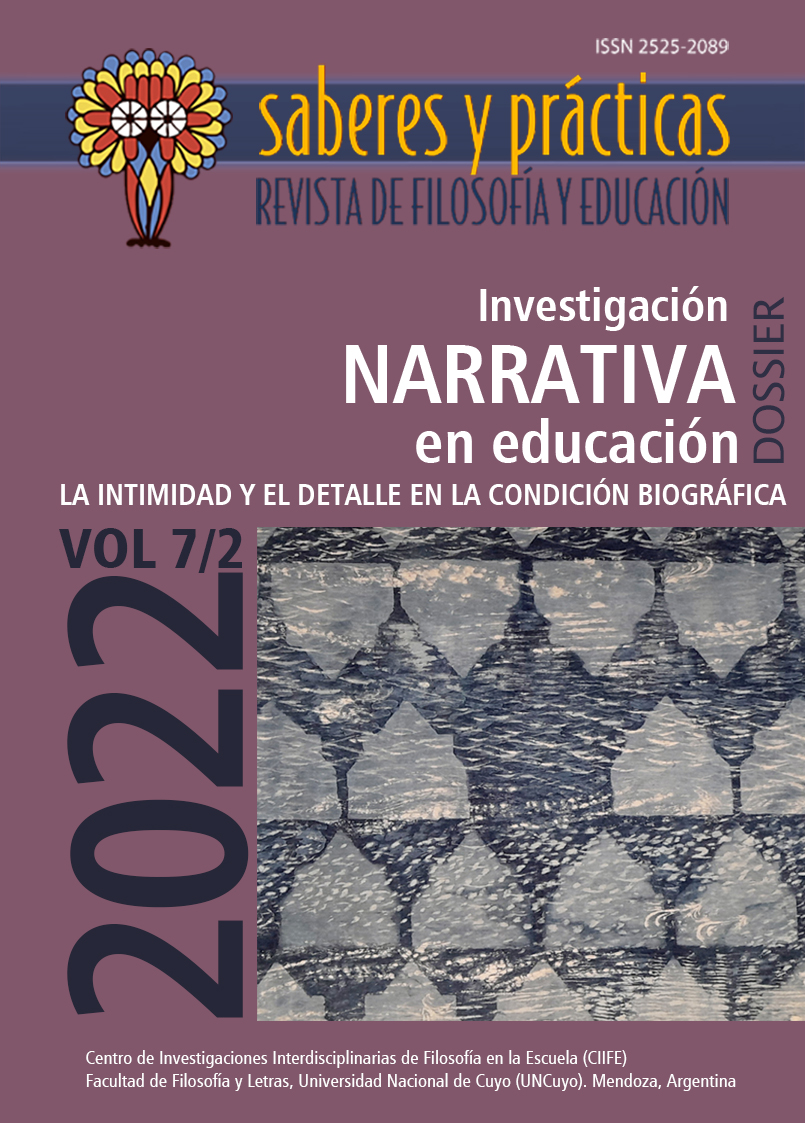Theoretical and methodological intimacies during the process of becoming and authoring myself as a narrative inquirer
DOI:
https://doi.org/10.48162/rev.36.075Keywords:
intimate scholarship, narrative methodologies, inquirer becoming, authorshipAbstract
This paper explores my becoming as a narrative inquirer in higher education. It offers an intimate look into the theoretical and methodological forms by which my research group at the School of Humanities in Mar del Plata National University has gathered its professors’ and students’ stories to analyze, among other topics, representations of curriculum; good teaching practices, memorable professors, and student teachers’ identities and experiences. During this becoming as inquirer, we have identified the following stations where we have met different methodologies that are as narrative as they are intimate, i.e. research of narratives; research with narratives; biographical-narrative research; narrative inquiry; poetic inquiry; autoethnography; and visual narrative inquiry. We examine the methodological and theoretical links between what we inquire into; how we do and re-present this; and who we become amid theoretical contents and methodological forms. By means of our work, we hope to continue our conversation with the larger narrative universe we find in higher education.
Downloads
References
Álvarez, Z., Porta, L., & Sarasa, M. C. (2011). Una experiencia en torno a la investigación sobre la enseñanza en el nivel superior. Revista de Educación, 2(3), 181-210.
Beaunae, C., Wu, C. H., & Koro-Ljungberg, M. (2011). Exploring performativity and resistance in qualitative research interviews: A play in four acts. Qualitative Inquiry, 17(5), 412-421.
Benjamin, W. (2020). Theses on the philosophy of history. In S. E. Bronner, & D. M. Kellner (Eds.), Critical theory and society. A reader (pp. 255-263). Routledge.
Bolívar, A., Domingo, J., & Fernández, M. (2001). La investigación biográfico-narrativa en educación. Enfoque y metodología. La Muralla.
Bourdieu, P. (1991). El sentido práctico. Taurus.
Bourdieu, P., & Passeron, J. C. (2003). Los herederos. Los estudiantes y la cultura. Siglo Veintiuno.
Bruner, J. (1997a). A narrative model of self‐construction. Annals of the New York Academy of Sciences, 818(1), 145-161.
Bruner, J. (1997b). La educación, puerta de la cultura. Visor.
Burns, M., Bally, J., Burles, M., Holtslander, L., & Peacock, S. (2022). Constructivist grounded theory or interpretive phenomenology? Methodological choices within specific study contexts. International Journal of Qualitative Methods, 21, 1-13.
Clandinin, D. J. (2013). Engaging in narrative inquiry. Routledge.
Caine, V., Estefan, A., & Clandinin, D. J. (2013). A return to methodological commitment: Reflections on narrative inquiry. Scandinavian Journal of Educational Research, 57(6), 574-586.
Clandinin, D. J. & Caine, V. (2013). Narrative inquiry. In A. A. Trainor & E. Graue (Eds.), Reviewing qualitative research in the social sciences (pp. 166-179). Routledge.
Clandinin, D. J., Cave, M. T., & Cave, A. (2011). Narrative reflective practice in medical education for residents: composing shifting identities. Advances in Medical Education and Practice, 2, 1-7.
Clandinin, D. J. & Huber, J. (2010). Narrative inquiry. In B. McGaw, E. Baker, & P. P. Peterson (Eds.), International encyclopedia of education (pp. 436-441). Elsevier.
Clandinin, D. J. & Murphy, M. S. (2007). Looking ahead: Conversations with Elliot Mishler, Don Polkinghorne, and Amia Lieblich. In D. J. Clandinin (Ed.), Handbook of narrative inquiry: Mapping a methodology (pp. 632-651). SAGE.
Clandinin, D. J., Steeves, P., & Chung, S. (2008). Creando espacios de investigación narrativa en la formación del profesorado. En L. Porta & M. C. Sarasa (Eds.), Formación y desarrollo de la profesión docente en el profesorado: Las buenas prácticas y sus narrativas (pp. 59-83). Universidad Nacional de Mar del Plata.
Connelly, F. M., & Clandinin, D. J. (2006). Narrative inquiry. In J. L. Green, G. Camilli, & P. Elmore (Eds.), Handbook of complementary methods in education research (pp. 477-487). Lawrence Erlbaum.
Corbin, J. M., & Strauss, A. L. (2007). Basics of qualitative research: techniques and procedures for developing grounded theory. Third Edition. SAGE.
Creswell, J.W. (2012). Educational research. Planning, conducting and evaluating quantitative and qualitative research. Pearson.
de Alba, A. (1998). Curriculum: Crisis, mito y perspectivas. Miño & Dávila.
De Laurentis, C.; Porta, L., & Sarasa, M. C. (2013). La formación del profesorado de inglés: espacios de indagación narrativa. Revista Arena, 3(1): 1-22.
Denzin, N. K. (2013). Writing and/as analysis or performing the world. In U. Flick (Ed.), The SAGE handbook of qualitative data analysis (pp. 569-584). SAGE.
Denzin, N. K. (2018). Performance, hermeneutics, interpretation. In U. Flick (Ed.), The SAGE handbook of qualitative data collection (pp. 200-216). SAGE.
de Vigan, D. (2015). D’après une histoire vraie. JC Lattès.
Dewey, J. (2008). El arte como experiencia. Paidós.
Eisner, E. W. (1993). Forms of understanding and the future of educational research. Educational Researcher, 22(7), 5-11.
Eisner, E. W. (1997). The promise and perils of alternative forms of data representation. Educational Researcher, 26(6), 4-10.
Erickson, F. (1997). Métodos cualitativos de investigación sobre la enseñanza. En M. Wittrock (Comp.), La investigación de la enseñanza, II. Métodos cualitativos y de observación (pp. 195-301). Paidós
Fenstermacher, G. (1989). Tres aspectos de la filosofía de la investigación en la enseñanza. En M. Wittrock (comp.), La investigación en la enseñanza, I. Enfoques, teorías y métodos (pp. 149-179). Paidós.
Gimeno Sacristán, J. (1998). El currículum: una reflexión sobre la práctica. Morata.
Goetz, J. P., & Le Compte, M. D. (1988). Etnografía y diseño cualitativo en investigación educativa. Morata.
Goodson, I. F. (2012). Developing narrative theory: Life histories and personal representation. Routledge.
Kim, J. H. (2015). Understanding narrative inquiry: The crafting and analysis of stories as research. SAGE.
Hamilton, M. L., Pinnegar, S., & Davey, R. (2016). Intimate scholarship: An examination of identity and inquiry in the work of teacher educators. In J. Loughran & M. L. Hamilton, (Eds.), International handbook of teacher education (pp. 181-237). Springer.
Huber, J., Caine, V., Huber, M., & Steeves, P. (2014a). La indagación narrativa como pedagogía en la educación: el potencial extraordinario de vivir, contar, volver a contar y revivir relatos de experiencias. Revista de Educación, 37(1), 33-74.
Huber, J., Li, Y., Murphy, S., Nelson, C., & Young, M. (2014b). Shifting stories to live by: Teacher education as a curriculum of narrative inquiry identity explorations. Reflective Practice, 15(2), 176-189.
Ingman, B. C. (2022). Artistic sensibility is inherent to research. International Journal of Qualitative Methods, 21, np.
Jackson, P. W. (1996). La vida en las aulas. Nueva introducción del autor. Paideia-Morata.
Jackson, P. (1999). Enseñanzas implícitas. Amorrortu.
Jackson, P. (2002). Práctica de la enseñanza. Amorrortu.
Jackson, P. (2004). John Dewey y la tarea del filósofo. Amorrortu.
Jackson, P., Boostrom, R. E., & Hansen, D. T. (2003). La vida moral en la escuela. Amorrortu.
Leite, A. y Suárez, D. (2020). Narrativas, docencia e investigación educativa. Márgenes, Revista de Educación de la Universidad de Málaga, 1(3), 2-5.
Litwin, E. (2000). Las configuraciones didácticas. Una nueva agenda para la educación superior. Paidós.
McCaffrey, G., Wilson, E., Jonatansdottir, S., Zimmer, L., Zimmer, P., Graham, I., ... & MacLeod, M. (2022). But is it hermeneutic enough? Reading for methodological salience in a scoping review of hermeneutics and implementation science. International Journal of Qualitative Methods, 21, np.
McEwan, H. & Egan, K. (Comps.). (1998). La narrativa en la enseñanza, el aprendizaje y la investigación. Amorrortu.
Morris, D. B. (2001). Narrative, ethics, and pain: Thinking with stories. Narrative, 9(1), 55-77.
Pierosara, S. (2011). Asking for narratives to be recognized: The moral of histories. Études Ricoeuriennes/Ricoeur Studies, 2(1), 72-83.
Porta, L., Álvarez, Z., & Sarasa, M. C. (2010). Una exploración del rol de los mentores en las trayectorias profesionales de los buenos docentes universitarios. Praxis Educativa, 14(14), 42-48.
Porta, L. G., & Flores, G. N. (2017). La hospitalidad en profesores memorables universitarios. REXE-Revista de Estudios y Experiencias en Educación, 16(30), 15-31.
Porta, L., & Sarasa, M. C. (2014). Resignificar la buena enseñanza desde la voz de docentes memorables en educación superior confrontada con Ortega y Gasset y otros académicos. Profesorado, 18(1), 293-306.
Porta, L., & Yedaide, M. M. (Comps.). (2017). Pedagogía(s) vital(es). Cartografías del pensamiento y gestos ético-políticos en perspectiva descolonial. EUDEM.
Prendergast, M. (2009). Introduction: The phenomena of poetry in research: “Poem is what?” Poetic inquiry in qualitative social science research. In M. Prendergast, C. Leggo, & P. Sameshima (Eds.), Poetic inquiry. Vibrant voices in the social sciences (pp. xix-xlii). Sense Publishers.
Richardson, L., & St. Pierre, E. A. (2005). Writing. A method of inquiry. In N. Denzin & Y.S. Lincoln (Eds.), The SAGE handbook of qualitative research. Third edition (pp. 959-978). SAGE.
Ricoeur, P. (1990). Soi-Même comme un autre. Editions du Seuil.
Rosiek, J. L., & Snyder, J. (2020). Narrative inquiry and new materialism: Stories as (not necessarily benign) agents. Qualitative Inquiry, 26(10), 1151-1162.
Sarasa, M. C. (2008). En torno a los modelos de la buena enseñanza. En L. Porta, & M. C. Sarasa (Comps.), Formación y desarrollo de la profesión docente en el profesorado: Las buenas prácticas y sus narrativas (pp. 183-217). Universidad Nacional de Mar del Plata.
Sarasa, M. C. (2014). Experiencias de enseñanza y de aprendizaje mediante la investigación biográfica y la indagación narrativa. Revista de Educación, 7(5), 157-170.
Sarasa, M. C. (2017a). Las posibilidades descolonizadoras de las narrativas en la formación inicial del profesorado. Revista de Educación, 8(12), 49-66.
Sarasa, M. C. (2017b). Relatos entramados de futuras identidades profesionales docentes. Una indagación narrativa en la formación inicial del profesorado de inglés. [Tesis Doctoral, Universidad Nacional de Rosario].
Sarasa, M. C. (2019). Student-teachers’ narratives of good language educators: Examining some contributions of poetic inquiry. ELT Research, 34 (26-29).
Sarasa, M. C. (2020). Urdimbres de seres y devenires docentes en la universidad. Una indagación narrativa en la formación del profesorado de inglés. Colección Tesis/Educación. EUDEM-CIMED.
Sarasa, M. C. (2021a). Indagar narrativamente en la formación del profesorado de inglés. Una autoetnografía performativa. Revista de Educación, 24(1), 297-215.
Sarasa, M. C. (2021b). Teacher educator identity negotiation as participant researcher: An autoethnography within TESOL teacher preparation. In E. R. Yuan & I. Lee (Eds.), Becoming and being a TESOL teacher educator: Research and practice (pp. 227-247). Routledge.
Sarasa, M. C. (2022). Narrative pedagogies in Argentinean university EL teacher education. In D. L. Banegas, E. Edwards, & L. S. Villacañas de Castro (Eds.), Professional development through teacher research: stories from language teacher educators (pp. 119-134). Multilingual Matters.
Sarasa, M. C., & Porta, L. (2018). Narratives of desire, love, imagination, and fluidity: Becoming an English teacher in a university preparation program. LACLIL, 11(1), 141-163.
Sarasa, M. C., & Porta, L. G. (2022). Relatos y contrarrelatos de experiencias a partir de metodologías íntimas. Una indagación narrativa visual en la formación del profesorado. En F. Ramallo, R. Godoy Lenz, & T. Ribeiro (Eds.), Investigaciones-vidas en educación: Conversar, escuchar y constelar (pp. 78-101). Editorial Universidad De La Serena.
Smith, B. (2017). Narrative inquiry and autoethnography. In M. Silk, D. Andrews, & H, Thorpe (Eds.), The Routledge handbook of physical cultural studies (pp. 505-514). London: Routledge.
Tishman, S., Perkins, D., & Jay, E. (1994). Un aula para pensar. Aique.
Tolman, M., & Tolman, R. (2009). La casa del árbol. Adriana Hidalgo.
Wyatt, M. (2016). Expressing research experience through pattern poetry. ELTED, 20, 51-59.
Published
How to Cite
Issue
Section
License
Copyright (c) 2023 María Cristina Sarasa
This work is licensed under a Creative Commons Attribution-NonCommercial-ShareAlike 2.5 Argentina License.





















